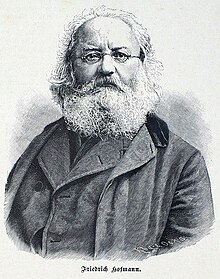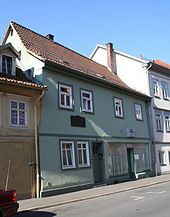Friedrich Hofmann (writer)

Friedrich Hofmann (born April 18, 1813 in Coburg , † August 14, 1888 in Ilmenau ) was a German writer .
Life
Friedrich Hofmann was born on April 18, 1813 in the house at Leopoldstrasse 28 in Coburg . His mother died in 1827, his father Johann Friedrich Hofmann, a musician at the ducal court, died in 1830. From 1828 to 1834 Friedrich Hofmann attended the Casimirianum grammar school in Coburg . From 1834 to 1840 he studied literature and history in Jena , where he joined the Arminia fraternity in the castle cellar .
In 1841 he moved to Hildburghausen in Thuringia , where he worked in the editorial office of Meyer's Konversationslexikon . In 1855 he worked briefly in Venice . In 1858 he moved to Leipzig to continue working on the lexicon and contributed to popular scientific journals such as Die Glocke and Panorama des Wissens und der Gewerbe . Hofmann married Bertha Barbera Fink in Rodach near Coburg in 1860 . From 1861 he worked as an editor, between 1883 and 1886 as editor-in-chief of the family magazine Die Gartenlaube . He also sat at the criminal table (Leipzig) , such as B. August Bebel testified. He was a member of the Ilmenau Gabelbachverein and an honorary citizen of Coburg. Hofmann died on August 14, 1888 in Ilmenau . Today a street in Ilmenau is named after him.
Services
Friedrich Hofmann worked on Meyer's Konversationslexikon . He also worked for charity, for 25 years he published annual anthologies with contributions by living poets under the title Christmas tree for poor children , which were sent as gifts to various cities and municipalities in order to use the proceeds from their resale to benefit children in need to let. Among the contributors to the volumes was u. a. Friedrich Rückert .
Monuments and plaques
Works
- The Battle of Foksan (play; Jena, 1838)
- The Feste Koburg (seal; Hildburghausen , 1854)
- The Koborgher Quackbrünnla (Hildburghausen, 1857)
- The Kinder Wundergarten (fairy tale collection; Leipzig, 1874)
- Germany's humiliation and elevation (poem with chants; Coburg, 1863)
- The harp in the storm (Leipzig, 1872)
- Three fighters (Festival; Leipzig, 1873)
- The donkey hunt, a happy heroic poem (poetry; Leipzig, 1874)
- Poet ordination (play; Leipzig, 1875)
- Haunted Ghosts at the Koburg Fortress (Leipzig, 1876)
- The children's festivals (4 booklets; Schleusingen 1853–1875)
- Opera texts ( libretti )
- The Pied Piper of Hameln (1877)
- The Wild Hunter (1882)
literature
- Hofmann, 3) Friedrich . In: Meyers Konversations-Lexikon . 4th edition. Volume 8, Verlag des Bibliographisches Institut, Leipzig / Vienna 1885–1892, pp. 619–620.
- Helge Dvorak: Biographical Lexicon of the German Burschenschaft. Volume I: Politicians. Sub-Volume 2: F-H. Winter, Heidelberg 1999, ISBN 3-8253-0809-X , pp. 373-374.
- Andreas W. Daum: Science popularization in the 19th century. Civil culture, scientific education and the German public 1848–1914 . 2nd, supplementary edition, Oldenbourg, Munich 2002, ISBN 978-3-486-56551-5 .
Web links
- Literature by and about Friedrich Hofmann in the catalog of the German National Library
- Works by and about Friedrich Hofmann in the German Digital Library
- Entry on Friedrich Hofmann in Kalliope
Individual evidence
- ^ Andreas W. Daum: Science popularization in the 19th century. Civil culture, scientific education and the German public 1848–1914 . Oldenbourg, Munich 2002, p. 150, 494 .
- ↑ ZDB -ID 548781-X and ZDB -ID 548782-1 , digital copies in the Munich digitization center (MDZ)
- ↑ Johannes Hohlfeld: The Bibliographical Institute: Festschrift for its centenary. Bibliographisches Institut, Leipzig 1926, OCLC 652504560 , p. 94. Quoted from: My father was a wanderer (first printing of the text 1847) , Edition in: Popular and traditional songs. Historical-critical song lexicon of the German Folk Song Archive
| personal data | |
|---|---|
| SURNAME | Hofmann, Friedrich |
| BRIEF DESCRIPTION | German writer |
| DATE OF BIRTH | April 18, 1813 |
| PLACE OF BIRTH | Coburg |
| DATE OF DEATH | August 14, 1888 |
| Place of death | Ilmenau |




